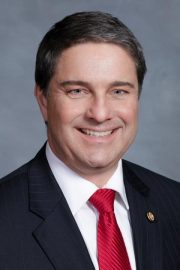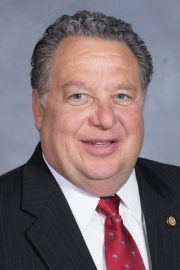
By Hunter Hines
Christian Action League
June 20, 2019
RALEIGH – Monday, two state Senators boldly spoke out against a measure that authorizes colleges and universities in the University of North Carolina system to sell beer and wine at collegiate sporting events. Alcohol is currently allowed in premium spaces during college games, but is not sold stadium-wide.
The bill, HB 389-ABC/Univ Athletic Facility, was championed by House Majority Leader John Bell (R-Wayne), and Sen. Rick Gunn (R-Alamance). HB 389 had already passed the House by a wide margin (88-24), and the Senate passed it Monday evening (35-12), but not before Senators Warren Daniel (R-Burke) and Rick Horner (R-Johnston) provided sage wisdom in opposition to its passage.
“Sen. Daniel’s and Horner’s speeches were graciously offered and their content should have been more than enough to persuade lawmakers of the foolishness of passing the bill. But all too often, it’s not the facts and it’s not the truth, it’s not even common sense that wins the day in politics, its power and money,” said Rev. Mark Creech, executive director of the Christian Action League. “Still, not everyone will sell their soul. There remains, bless God, a few men and women of good judgment and conviction.”

When the Senate floor opened for debate on the proposed legislation, Daniels told his fellow lawmakers:
“ First of all I want to say that I love my brother, Rick Gunn. We’ve been through a lot together in the past nine years and have done a lot of good things for the state of North Carolina. On this particular issue, I disagree with his support of this House Bill, and thinking back six years ago, it still saddens me that we have eliminated the alcohol-free environment that we once enjoyed at all minor league ballparks in the state. Today, it saddens me that we are thinking of eliminating one of the last family-friendly venues in the state of North Carolina – UNC sporting events.
“So, I wish we weren’t at this crossroads tonight, because with all the challenges facing our young people, I think we ought to be expanding the alcohol free entertainment venues, not decreasing them.
“I understand the arguments that are being made, that it would decrease alcohol related incidents, that it would provide another revenue stream for the universities, that everyone else is doing it so why shouldn’t we – though that argument never worked on my Mom.
“Some of the things that concern me, there’s no provisions for additional law enforcement at ball games in this bill, there’s no alcohol free family sections at stadiums, and there’s no substance abuse training or awareness to stem the binge drinking and underage drinking of our college students, or to decrease the number of alcohol related deaths among students.
“Whether we want to admit it or not, we’re talking about the most destructive drug in the history of mankind, and we want to introduce it into our sporting arenas? I ask the question, ‘Are teams not entertainment enough?’ It will no doubt change the atmosphere of every UNC sporting event from now on, and we are preferring one group of citizens over another.
“I can’t help but point out the irony compared to cigarette smoking, because there’s not a restaurant in North Carolina in which you’re allowed to smoke. We banned it because of its effects on those who choose not to smoke.
“I realize that maybe I’m one of the dinosaurs in the room holding on to a policy that has been in existence since, I guess, 1789. Times change, cultures change, morals change, usually not for the better in recent years.
“So I hope that Senator Gunn is right, that this will reduce the number of alcohol related incidents at our UNC sporting events. I hope the universities will be vigilant in managing this new responsibility, and the potential tort liability that it places upon them.
“It is for these reasons that I can’t support the bill.”
Immediately after Daniel’s remarks, Sen. Rick Horner was recognized to speak and argued the following:

“ This bill is a classic example, to me, of putting profit before principle. It’s all about money and revenue for college sports. It’s not about increased safety.
“I wish Senator Alexander was here, because I rarely complement Jim Valvano [former coach for NC State University], but he had a great saying that ‘people use statistics like drunks use a lamppost. It offers them support, but seldom for illumination.’
“When I look at the statistics on this, I find it the same way. I know it’s not going to reduce alcohol problems in our stadiums. None of this revenue is going to alcohol treatment. None of this new money is going to help with the problem on our campuses. And that’s a fact!
“Now I’ve done extensive research since the mid-seventies on alcohol consumption at college stadiums, and there is no shortage of alcohol in our stadiums.
“I just think like others, that there should be a place in our public universities where you can take your families and be free of alcohol.
“And I’ll vote against the bill, obviously, and I encourage others to do so.”
Tailgating already provides tremendous amounts of alcohol at collegiate sporting events and is not eliminated by HB 389. Instead, the bill adds stadium-wide sales of alcohol, while the bill’s proponents site data that claims that when stadium-wide alcohol sales are added, alcohol-related game day offenses drop.
“The data they sited, however, was not reliable for crafting a public policy as momentous as allowing for greater access to alcohol on college campuses,” said Rev. Creech. “The stats mentioned were not the result of ‘scientific evaluation’ or ‘peer-reviewed’ studies. Instead, they were mostly anecdotal.”
Creech added that there is very reliable evidence, which unequivocally concludes that making alcohol more available among a population that already drinks heavily, and a substantial portion of which is already in need of some clinical intervention around their drinking, will exacerbate rather than alleviate excessive drinking and its related harms.
“This describes drinking among college students to a tee,” Creech said. “What we’ve done on this bill is close our eyes to all the real science, close our eyes to better judgment, close our ears to sounder arguments, close our ears to our better angels, and foolishly followed a Pied Piper whose piping was played in flat notes in the key of stupidity.”
The measure now goes to Governor Cooper for his signature.
Courageous lawmakers who voted “No” in the House were:
Democrats: Ball; Gailliard; Graham; Logan; Pierce; Quick
Republicans: Arp; Blackwell; Brisson; Brody; Cleveland; Dixon; Elmore; Hurley; Jarvis; McNeill; Pittman; Presnell; Riddell; Sauls; Setzer; Shepard; Speciale; R. Turner; White
Courageous lawmakers who voted “No” in the Senate were:
Democrats: Clark; D. Davis
Republicans: T. Alexander; Brown; Burgin; Daniel; Edwards; Ford; Gallimore; Horner; McInnis; Sanderson
